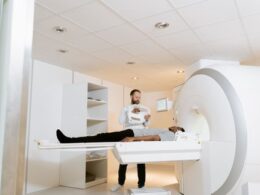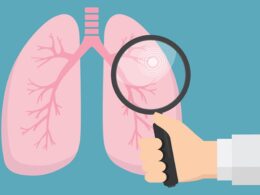the health transformation . institute
research institute & knowledge portal
Joaquim Cardoso MSc*
Chief Strategy Officer (CSO), Chief Researcher and Editor
November 21, 2022
MSc* from London Business School — MIT Sloan Masters Program
Executive Summary:
- The UK National Screening Committee has recommended, for the first time, that all four nations in the UK should implement a national lung cancer screening programme.
- Under the recommendation, screening would be targeted at high-risk people aged 55 to 74 years with a history of smoking and be integrated with smoking cessation services.
- The existing NHS England pilot ‘ Targeted Lung Health Checks (TLHC)’ ‘provides a practical starting point for implementation of a targeted lung cancer screening programme in England’,
- However, to help implement a UK-wide programme, ‘more modelling work is needed’, it added.
- The UK NSC said: ‘Targeted lung cancer screening would aim to find people with the disease early when they may not have any symptoms.
- ‘People are more likely to be cured of lung cancer if the disease is found early before it has spread to other parts of the body. A national programme would have the potential to save thousands of lives.’
Source: Pulse Today
ORIGINAL PUBLICATION (pulse today)
National lung cancer screening programme to be rolled out
Pulse Today
Emma WilkinsonSofia Lind
November 22, 2022
The UK National Screening Committee has recommended, for the first time, that all four nations in the UK should implement a national lung cancer screening programme.
A recommendation from the UK NSC means national commissioners are legally obliged to introduce a screening programme, NHS England confirmed to Pulse.
Under the recommendation, screening would be targeted at high-risk people aged 55 to 74 years with a history of smoking and be integrated with smoking cessation services.
Under the recommendation, screening would be targeted at high-risk people aged 55 to 74 years with a history of smoking and be integrated with smoking cessation services.
The existing NHS England pilot ‘ Targeted Lung Health Checks (TLHC)’ ‘provides a practical starting point for implementation of a targeted lung cancer screening programme in England’, the screening committee said.
However, to help implement a UK-wide programme, ‘more modelling work is needed’, it added.
The UK NSC said: ‘Targeted lung cancer screening would aim to find people with the disease early when they may not have any symptoms.
‘People are more likely to be cured of lung cancer if the disease is found early before it has spread to other parts of the body. A national programme would have the potential to save thousands of lives.’
‘People are more likely to be cured of lung cancer if the disease is found early before it has spread to other parts of the body. A national programme would have the potential to save thousands of lives.’

A DHSC spokesperson told Pulse: ‘We’re working to improve outcomes for cancer patients across England, including lung cancer, and are progressing towards having 75% of patients who have been urgently referred for suspected cancer either diagnosed or have cancer ruled out within 28 days.
… ‘We’re working to improve outcomes for cancer patients across England, including lung cancer, and are progressing towards having 75% of patients who have been urgently referred for suspected cancer either diagnosed or have cancer ruled out within 28 days.
‘We are considering a recommendation by the UK National Screening Committee for a screening programme for lung cancer targeted at people aged 55 to 74 who are identified as being at high risk of lung cancer.’
UK Lung Cancer Coalition clinical advisory group member Professor David Baldwin, a consultant respiratory physician in Nottingham, said:
‘Following the very welcome recommendation from the UK National Screening Committee that screening should be offered to people aged 55 to 75 who are at higher risk of developing lung cancer it is important that this is approved by Government without delay so that the benefits already shown in England can be more widely seen in all UK countries.’

The UKLCC has also highlighted that the screening programme needs to take into account current health inequalities in lung cancer diagnosis.
A recent report from the coalition said it takes longer for people from ethnic minority backgrounds to get diagnosed with lung cancer, and people in the LGBTQ+ community have a disproportionately higher risk of developing lung cancer.
…it takes longer for people from ethnic minority backgrounds to get diagnosed with lung cancer, and people in the LGBTQ+ community have a disproportionately higher risk of developing lung cancer.
Yet the reasons for this are not fully understood and more data is ‘urgently needed’.
This would include extending the clinical remit of the National Lung Cancer Audit to collect more data on ethnicity, LGBTQ+ and other health inequality factors — such as gender, religion, disability, distance from health service and homelessness.
This would include extending the clinical remit of the National Lung Cancer Audit to collect more data on ethnicity, LGBTQ+ and other health inequality factors — such as gender, religion, disability, distance from health service and homelessness.

The report also suggested that telephone helplines should be set up at the regional level to offer direct access to lung cancer health checks to take pressure off GPs.
And it said more focused awareness campaigns are needed across the UK to address local needs and communities.
The report also suggested that telephone helplines should be set up at the regional level to offer direct access to lung cancer health checks to take pressure off GPs.
And it said more focused awareness campaigns are needed across the UK to address local needs and communities.
Dr Steve Holmes, a GP in Somerset and member of the UKLCC Clinical Advisory Group, said lung cancer was one of the most challenging cancers to identify, and one where the inequalities are marked, but ‘where increasingly we can make a difference’.
lung cancer was one of the most challenging cancers to identify, and one where the inequalities are marked, but ‘where increasingly we can make a difference’.
‘I hope that this will result in appropriate support and funding to help our patients with lung cancer to get prompt timely identification and treatment wherever they live and whatever their background.’
The news comes as Pulse exclusively revealed that the Government had given the go-ahead for lung cancer screening pilots over a decade ago.
Originally published at https://www.pulsetoday.co.uk on November 22, 2022.
Names mentioned
UK Lung Cancer Coalition clinical advisory group member Professor David Baldwin,
Dr Steve Holmes, a GP in Somerset and member of the UKLCC Clinical Advisory Group,












